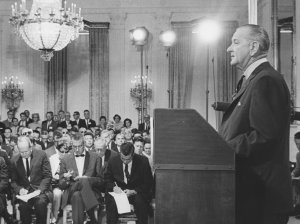Announcer: As Vietnam divided the country, it also brought some changes in relations with other countries. Some of the America’s friends, notably South Korea, New Zealand, the Philippines and Australia, sent troops to help fight in Vietnam.
In the colder waters of the Atlantic, it was a different story. England supported the U.S. position morally and diplomatically, but sent no troops.
France, America’s oldest ally, opposed U.S. involvement in the war and backed many diplomatic moves aimed at discrediting American objectives in that country.
When he returned from a visit to Europe, Richard Nixon had this observation about America’s friends.
President Richard Nixon: "As I traveled through the capitals of Europe, what was shocking to me was that in talking to old friends in London and Paris and Rome -- friends of freedom, too, who I thought understood this great conflict between Communism and freedom -- there was not just neutrality with regard to our position in Vietnam, but opposition to it, although publicly, of course, they are remaining, shall we say, politely silent."
Announcer: French President Charles de Gaulle continued moving his country farther away from the United States into a neutral position in the Cold War by wooing the Soviet Union and other Communist nations. De Gaulle met an 11-day trip to Russia, which ended with a joint call for an end to foreign intervention in Vietnam.
Soviet Premier Alexei Kosygin reciprocated later in the year with a 9-day visit to France. De Gaulle gave him a royal welcome.
Charles De Gaulle: "(French.)"
Announcer: De Gaulle also pulled the rug out from under the entire European Allied Mutual Defense System by declaring French withdrawal from all military aspects of NATO and demanding that all foreign bases be removed from French soil.
The French Ambassador in Washington, Charles Lucet, said that this did not mean France was backing out of her commitments.
Charles Lucet: "We want to remain your friend and your ally within the Atlantic Alliance. We know that this Alliance is still indispensable for the balance and for the peace of the world. We do not think that the military threat is so great in Europe today. But if the threat were to be revived, you know which side we would be on."
Announcer: The other 14 NATO members decided that the organization could function regardless of French policy and reaffirmed that the pact would continue. Plans were made to move the military command to Belgium as France withdrew her troops from NATO command.
President Johnson sought during 1966 to maintain and improve relations with many nations. He traveled to Mexico and expressed continued American interest in the Alliance for Progress. The Chief Executive made the most extensive trip ever by an American President: he journeyed more than 32,000 miles, stopping in New Zealand, Australia, the Philippines, South Vietnam, Thailand, Malaysia and South Korea. He was warmly received at every stop. He told the people in each of these countries that American objectives in that part of the world are to build freedom, peace and prosperity for all and to eradicate ignorance, poverty and disease.
President Lyndon B. Johnson: "There is real hope, a real vision in this vast area of the world. Nations are joining together not only to resist the Russians and to prove that might does not make right, but to make a peace ally possible for all of their people."
Announcer: Dispite the war in Vietnam, Russia expressed a desire for better understanding with the United States in areas of mutual interest. An Air Pact was signed, providing for direct airline service between New York and Moscow. A Treaty to Ban Nuclear Weapons in Outer Space was signed by the U.S., Russia and other UN members.
Diplomats also revealed that a Nuclear Nonproliferation Treaty was nearer to reality than ever before; and President Johnson announced that Americans would find it easier in the future to travel in Communist countries.
Announcer: Areas of mutual interest also made an exchange of weather data gathered by the satellites of both nations.











